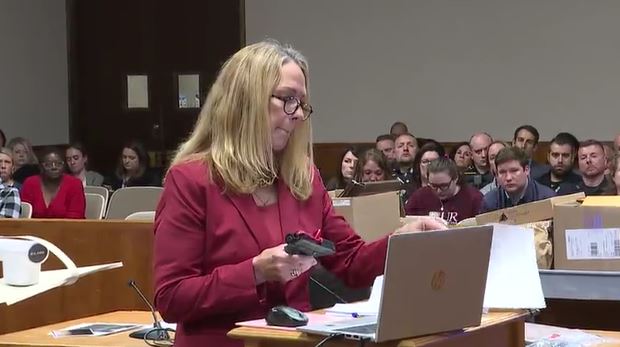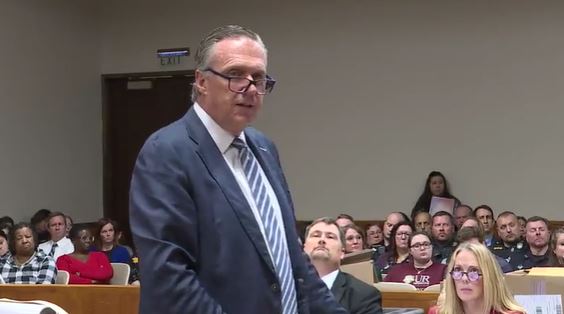Deliberations will continue Friday in the trial of Kelvin Vickers, jurors sent home
[anvplayer video=”5195830″ station=”998131″]
ROCHESTER, N.Y. — Jury deliberations have ended for the second day on Thursday in the trial of Kelvin Vickers, the man accused of killing Rochester Police Officer Tony Mazurkiewicz and two others.
Thursday’s deliberations concluded when the jury agreed unanimously on all counts, except for two. The jury is deadlocked on the counts of aggravated murder and aggravated attempted murder.
The four alternate jurors were dismissed on Thursday because the deliberations have been going on too long for them to catch up. Jurors have asked for several read-backs.
The judge then sent the jury home for the evening. Deliberations will resume at 9 a.m. Friday.
Jurors asked to return to the courtroom to see surveillance video showing Vickers in and around the Laser home where officers found him hiding in a crawl space. The jury also requested a read-back of testimony from a gun expert. After that, the jury heard a read-back of legal instructions for second-degree murder and criminal possession of a weapon.
Deliberations began on Wednesday at noon after ten days of testimony and Tuesday’s closing arguments. Before deliberations began, jurors listened to Judge Julie Hahn read 133 pages of instructions including the legal definition of aggravated murder, reasonable doubt, and the presumption of innocence.
Vickers is accused of carrying out a shooting that killed Officer Anthony Mazurkiewicz and wounded his partner Officer Sino Seng while they were working undercover.
Vickers is also accused of shooting three other men on North Clinton Avenue the day earlier. Two of those men, Ricky Collinge Jr. and MyJel Rand, died. The two RPD officers were investigating those murders and an illegal marijuana trade when they were ambushed in their unmarked minivan on Bauman Street.
Prosecutors say that Vickers is a gang member brought in from Boston during a turf war between factions over the illegal marijuana trade.
During Wednesday’s deliberations, jurors asked for a read-back on the description of a vehicle that gunfire came from while it was traveling along North Clinton Avenue on July 19, the day before Collinge and Rand were murdered. Jurors also returned to the courtroom to watch security camera video of that car.
Vickers is charged with reckless endangerment for that gunfire which didn’t strike anybody. Vickers is also charged with arson for burning a car that was tied to the triple shooting on North Clinton Avenue the next day.
In total, Vickers is facing more than 20 charges for crimes that happened over the span of three days. The jury is deliberating on the charges in the order that the crimes occurred. Here is the list of Vickers’ charges:
- Aggravated murder
- Four counts of first-degree murder
- Second-degree murder
- Attempted aggravated murder
- Two counts of second-degree attempted murder
- Second-degree assault
- Fourteen counts of second-degree criminal possession of a weapon
- First-degree reckless endangerment
- Fourth-degree arson
For the jury to find Vickers guilty of the most serious charge, aggravated murder, they must decide that Vickers knew he was ambushing police officers. Being found guilty on that charge guarantees that Vickers will get life without parole.
Tuesday’s closing arguments wrapped up a four-week trial that has been emotional for the families of the victims. The Mazurkewicz family was escorted into the courtroom on Tuesday by members of the Rochester Police Tactical Unit, which Officer Mazurkewicz was a part of. They listened to the 17 shots that were fired into the minivan he and officer Seng were sitting in when they were ambushed.
Officer Mazurkewicz’s daughter struggled to keep her composure, knowing two of those shots killed her father. The district attorney says Vickers knew there were cops in that van.
“Why kill a police officer? Well, here’s my suggestion, my argument. The defendant and his accomplice knew they were hot in the eyes of law enforcement, they had to know that,” said Monroe County District Attorney Sandra Doorley. “They had just shot up a neighborhood the night before, they just killed two people and injured another the night before, they burned up a car the night before. They had an armory of weapons and ammunition at both 55 and 52 Laser and they had a stack of drugs.”

Vickers’ associates, she argued, thought he would be the best person to carry out the ambush because he was from Boston and had the best chance at a quick escape.
“They knew the cops were closing in on them, what better way to save themselves or at least buy themselves a little additional time than to send the outsider to take care of the problem. They needed time to clear the house,” said Doorley.
Vickers’ defense attorney Mike Schiano admitted there has been a lot of emotion in this case.
“You also promised not to let sympathy play any role in your decision making in this case. Yes, this was an emotional case,” Schiano said. “Yes, you saw grown men upset on the witness stand, yes I know a number of you jurors were quite upset during the course of some of this testimony but folks, you gotta set that aside. You are the triers of fact.”

Schiano says there was a gang war going on between two drug dealers in the city and video from the moments before the ambush indicates the side Vickers was on and that he thought the people in the minivan could have been their rivals.
“They have one guy hiding behind a garbage can, one guy sneaking across the street and one guy sneaking out the back door. Do they really think they’re cops? Do they really think they’re cops?” asked Schiano.
DA Doorley says the argument doesn’t hold weight because the previous interactions between these groups had been drive-by shootings.
“With increased violence, brings increased police presence. Did the defendant and his associates really think that the police were going to sit back after all of these shootings, these murders and just stop. Did they really think that the police didn’t have any leads?”
You can see our complete coverage of the trial here:
- DAY TEN: Prosecution and defense rests case in Vickers trial
- DAY NINE: ‘Barrage of bullets’: Officer Sino Seng testifies about ambush that wounded him, killed partner
- DAY EIGHT: Officer Mazurkiewicz’s widow cries as jury watches video of moments before fatal ambush
- DAY SEVEN: Jury hears testimony on DNA evidence
- DAY SIX: Jury sees body camera footage of Vickers hiding in crawl space
- DAY FIVE: Tactical officers testify about night of Officer Mazurkiewicz’s death
- DAY FOUR: Prosecution wraps up case in murder of Ricky Collinge Jr. and MyJel Rand
- DAY THREE: Evidence technicians speak about recovering bullets in shooting of Collinge and Rand
- DAY TWO: Jury sees body-worn camera footage in shooting of Collinge and Rand
- DAY ONE: Opening statements; Victim’s family sits 10 feet from Vickers